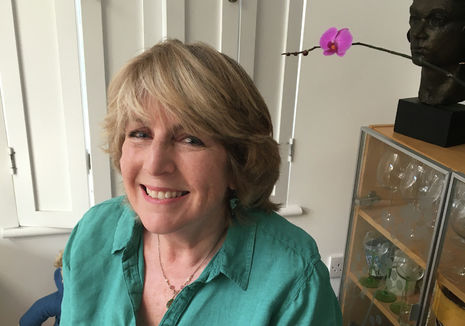Book Review: A daily chronicle of Cambridge connections
Zoe Zhang reviews Rosie Zanders’ book Cambridge per diem

To the vast majority of Varsity’s writers and readers, Cambridge is probably first and foremost a university city, only those with the honour of having resided in the city more permanently might be inclined to disagree, but this number is likely vanishingly small, with a mere 0.2% of the UK population living in Cambridge in a non-student capacity. To the wider world, this image persists, as might be surmised by the ubiquity of university-related apparel being flogged in Cambridge shop windows, much of it destined to wind up adorning the chests of visitors’ relatives in climes very far removed from the British Isles.
Rosie Zanders’ Cambridge per diem promises to add some much needed three-dimensionality into this fairly flat image of the city from the get-go, promising on the very first page to “afford readers some new insights into Cambridge and its inhabitants.” To say that it completely does away with Cambridge as the university city is untrue – but it succeeds gloriously at illuminating the twists and turns of the eight centuries which Cambridge has spent as a university city, proving exactly why the city is known as such, without neglecting the many other kinds of human stories lurking underneath this scholarly surface.
Local heroes, musical histories and feminist struggle intertwine its pages, which are ideally organised so as to offer time-pressed readers a concise but comprehensive daily read: the many stories which the long-time Blue Badge guide has collated together in this 300-page volume are separated according to the day of the year on which they occurred, so that the book is best savoured in small quotidian snippets, although it had to be read continuously from start to finish for the purposes of this review. Helpfully, recurring characters like Henry VIII, Pink Floyd’s Syd Barrett, or the Chinese poet Xu Zhimo have their general background repeated on every day which pertains to their lives, so the thread of their stories isn’t lost over the several busy weeks or months which might intervene between their appearances.
“It is in moving beyond the University itself, however, that the book arguably shines, especially in the hands of a Cambridge student.”
To those given to scoffing at the thought of Trinity, the fact that some 34 pages of the book play host to Trinitarian tales might come as a disappointment, but this can hardly be helped considering the remarkable way in which Trinity’s mythical status, whether deserved or overhyped, has steadily attracted all manner of significant happenings over the centuries – whether one believes Eddie Redmayne deserves more attention than Caian Stephen Hawking or Newnham alumna Diane Abbott is up for debate, but no amount of complaining will change the fact that the Olympic Torch spent the night at Trinity on the 8th July 2012, rather than any other college. In fact, Zanders does a brilliant job of informing readers on the peculiar histories of many of the newer colleges, painting a sympathetic portrait of Sir David Robinson, founder of the eponymous college, who avoided the public spotlight so assiduously that even his burial at sea evaded press coverage, with the papers having been diverted to the wrong lifeboat station some 300 miles away.
It is in moving beyond the University itself, however, that the book arguably shines, especially in the hands of a Cambridge student. How many of us are familiar with the inspiration behind the much-lambasted abstract statue in Market Square – Walter ‘Snowy’ Farr, who raised thousands of pounds for charity after retiring as a road-sweeper? Perhaps the gownie-townie split could be healed if only we were more in tune with the life and spirit of Cambridge as a city in which normal people work, eat and sleep year-round, rather than the mere host of Michaelmas, Lent and Easter terms: people which for a long time included Syd Barrett, who unexpectedly retired from rock stardom to settle into a modest townhouse in St. Margaret’s Square after retiring permanently from the public eye in 1982, when he walked the 60 miles from London to Cambridge, his birthplace, on foot. His last job, Zanders relates, was sorting trolleys outside Mainsbury’s. Even the Beatles are presented as simply human, just like any other, in Cambridge per diem: the understated anecdote about a poorly-received Beatles concert on the 19th March 1963 at the Regal Cinema next to Spoons acts as a pleasant antidote to the enduring power of Beatlemania which continues to recruit legions of teenagers in the UK every year with seemingly inexhaustible reserves of energy.
To all those interested in having Cambridge stay with them even after they graduate in a more meaningful sense than a hazy memory of drunken reveries, exam season grinding and sumptuous college formals, Cambridge per diem is a brilliant read.
 News / University Council rescinds University Centre membership20 February 2026
News / University Council rescinds University Centre membership20 February 2026 News / Hundreds of Cambridge academics demand vote on fate of vet course20 February 2026
News / Hundreds of Cambridge academics demand vote on fate of vet course20 February 2026 News / Judge Business School advisor resigns over Epstein and Andrew links18 February 2026
News / Judge Business School advisor resigns over Epstein and Andrew links18 February 2026 News / Union cancels event with Sri Lankan politician after Tamil societies express ‘profound outrage’20 February 2026
News / Union cancels event with Sri Lankan politician after Tamil societies express ‘profound outrage’20 February 2026 News / Caius students fail to pass Pride flag proposal20 February 2026
News / Caius students fail to pass Pride flag proposal20 February 2026











